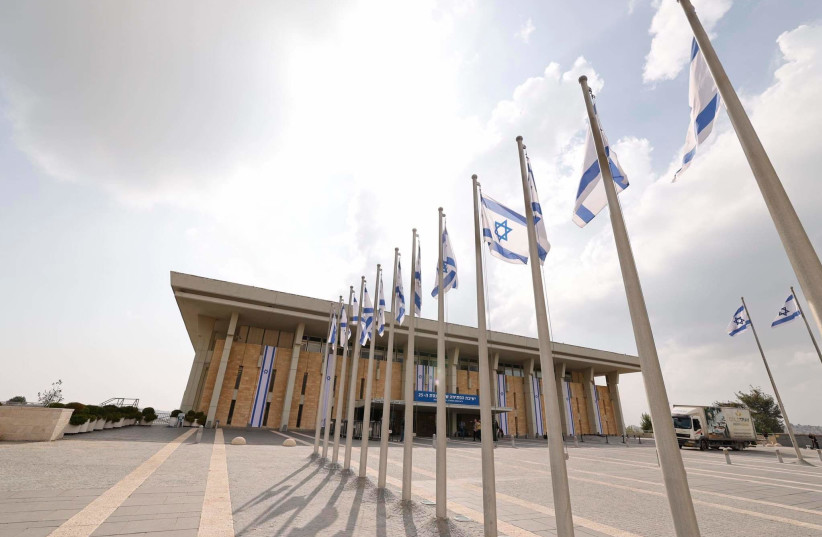Israel’s parliament (Knesset) held its final plenum session on Wednesday before beginning its annual spring recess, which officially starts on Sunday and is scheduled to continue until May 19.
In recent days, Knesset members from the opposition and family members of Israelis being held hostage in Gaza have criticized the fact that parliament was recessing despite the ongoing war and amidst a broad uptick in protests against the government and in favor of a hostage deal.
During the plenum session, protesters smeared yellow paint on a window that divides the visitor’s balcony from the main hall.
The Knesset could convene during the recess under certain circumstances and is likely to do so, but the governing coalition refused requests by the opposition to completely cancel the break.

Opposition leader and Yesh Atid head Yair Lapid did try to prevent the break from occurring, urging coalition lawmakers to reconsider and halt the scheduled recess.
In a fervent plea, he implored on social media, “As we embark upon the final week of Knesset sessions before the recess, it defies belief that we would proceed with business as usual at such a critical juncture.” Lapid emphasizes the gravity of the situation, stating, “Hostages don’t get reprieves, and those on the frontlines in Gaza don’t get breaks.”
Shira Albag, mother of hostage Liri Albag spoke on Tuesday during an emotional session of the The Committee on the Status of Women and Gender Equality, stating “[The hostages] are undergoing rape on a daily basis and you’re ignoring it. I hear her shouting to me, ‘Mother, save me, Mother’ and I want to die there. You are silent and are going on recess, for the glory of the State of Israel.”
MK Pnina Tamano-Shata: 'Committee won't go on recess'
In a commendable response, Committee Chair MK Pnina Tamano-Shata pledged to the hostages’ families, “This committee won’t go on recess at all. When you want to come here, the committee is open to you.”
For the past few weeks, it has seemed as if the ruling coalition may fall apart, mainly due to the issue of haredi draft to the IDF. For a government to fall, the Knesset would need to convene and vote to disperse itself, and opposition MKs accused the coalition of refusing to cancel the recess to block the option of bringing down the government at least until May.
Regardless of how the Knesset protocol works – and the fact that most MKs are not actively involved in the war cabinet or the direction this conflict is taking – Israel’s politicians must be aware of the message this sends to the public, and how they are perceived: like they are putting themselves before the well-being of the country.
Ordinary Israelis – those who have balanced IDF reserve duty with work and life, wives left at home with spouses away on military duty, parents trying to balance the stresses of war with maintaining normalcy for their children – these people do not get the chance to take a six-week break from life. Every day continues for them, without the security and the knowledge that in a month and a half, they get to return to their jobs.
Things must change during the war. In the last few days of March, following a consultation between Defense Minister Yoav Gallant and Chief of Staff Lt.-Gen. Herzi Halevi, the IDF confirmed on Friday that it would not hold the Air Force Flight and Fleet in Eilat on this year’s Independence Day.
The military explained that the step came as a result of the army’s focus on the war and upon a recommendation of the commanders of the navy and the air force.
This is an admirable and understandable position for the military to take, as minimal as it may seem. While certain aspects of Israeli life have tried to get back to being as normal as possible, the country is still in the middle of the most serious war it has seen in 50 years, and all the signals point to things getting worse before they get better.
Did any other politicians take such a stance regarding their six-week vacation? Or is it business as usual for the elected policymakers, who believe they are deserving of such a break?
As our soldiers continue to fight on the frontlines in both the North and the South of the country, and as the hostages – and their families – fear every second for their lives and continue to battle the unknown at the hands of Hamas terrorists, we wish our MKs a happy and peaceful vacation. You don’t deserve it.
